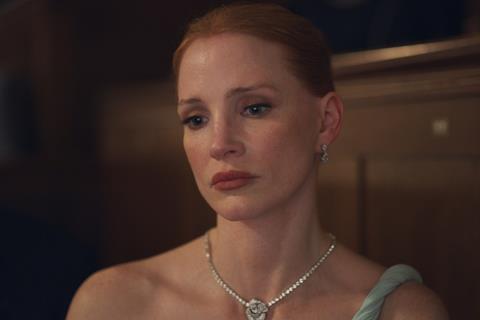Mexican dancer Isaác Hernandez co-stars

Dir. Michel Franco. Mexico/US. 2025. 100mins
Love and dance make up one of the longest-established couples in cinema. When the dance happens to be ballet, it’s likely that the choreography will come with an intense edge of amour fou – and if you mix in real-world politics, things may be headier and darker still. The idea of the erotic pas de deux as power play is at the heart of Dreams, the Berlinale competition entry from uncompromising Mexican writer-director Michel Franco.
Directly rooted in the politics of class and nationality
Franco’s second collaboration with Jessica Chastain, following 2023’s Memory, Dreams pairs the American actor with acclaimed Mexican dancer Isaác Hernandez, currently of the American Ballet Theatre. With its ironically innocuous-seeming title, this is a love story of sorts, but one directly rooted in the politics of class and nationality, with a newly acute relevance given the new US government’s intensified hostility to immigration. Two terrific central performances, and Chastain’s star power in a risk-taking, sexually charged role, should bring ample attention to a bold, crisply-executed auteur statement.
The film begins with a disturbing image familiar from too many news stories – a lorry seemingly abandoned by a roadside, with people trapped inside crying out to escape. When the doors are opened from outside, the passengers – Latin Americans trying to cross into the US – are summarily robbed by bandits, but one man staggers off and begins a long and demanding journey north. Eventually arriving in San Francisco, he enters a luxurious town house, and gets a rapturous, sexually heated welcome from the woman who lives there. The young man is Fernando (Hernández), a Mexican ballet dancer, and she is Jennifer (Chastain), the wealthy daughter of an extremely powerful magnate (Marshall Bell).
Like her father and her brother (Rupert Friend), Jennifer is very much engaged in philanthropical activities. While Dreams is sparing with back story, it is apparent that she and the rather younger Fernando met at the Mexico City dance centre that she supports, and have embarked on a mutually passionate relationship. He has risked his life crossing back into the US to be with her – but also in the hope of pursuing his dance career there.
While Jennifer lavishes attention on Fernando, he soon realises that her highly codified visibility as a socialite prevents her from acknowledging their relationship in public. Asserting his independence, he keeps his distance. Later, he reappears and lands a place in a San Francisco ballet company. But things only run smoothly for so long – and eventually, the couple’s power imbalance starts to play itself out in a new and very disturbingly amplified form.
While the film initially appears to pitch itself as a realist character-based psychological drama, in the manner of Memory or Franco’s earlier Chronic, the story’s political dimension, together with a high degree of stylisation, bring it somewhat closer to his apocalyptic vision of class conflict New Order (2020). Here, the stylisation very much revolves around Jennifer, who – as Fernando complains – is someone playing a part. Jennifer appears for much of the time in hyper-poised guise, stepping in and out of limos or wearing almost absurdly chic apparel (costume designer Mitchel Travers excels); all this cleverly plays on Chastain’s own star image, often associated with a lofty, distant froideur.
If Chastain and Hernández do not make an immediately obvious match, that is partly the point: they play two people attracted because of their difference, but who may not ultimately be able to overcome it, either to their satisfaction or society’s. Hernández has an easy, relaxed form of intensity, and his lean, kinetic grace as Fernando on the dance floor and in daily life (not to mention the full-on sex scenes) highlight the contrast with Jennifer’s hyper-formalised social guise – a contrast informed by all the differences of nationality, wealth and class. Given Isáac’s vocation, the sex scenes between him and Jennifer have a heightened balletic, athletic quality, indicating undiluted mutual desire but not necessarily of the reassuring Valentine’s Day variety.
A story which might seem the stuff of high melodrama is given a very different charge by Franco’s characteristic rigour – an uninflected cleanness and clarity in Yves Cape’s cinematography, and a minimum of narrative frills, driving the narrative towards a conclusion that is one of this director’s starkest yet.
Production company: Teorema
International sales: The Match Factory, sales@matchfactory.de
Producers: Michel Franco, Eréndira Núñez Larios, Alexander Rodnyansky
Screenplay: Michel Franco
Cinematography: Yves Cape
Editors: Oscar Figueroa Jara, Michel Franco
Production design: Alfredo Wigueras
Main cast: Jessica Chastain, Isaác Hernández, Rupert Friend, Marshall Bell
























